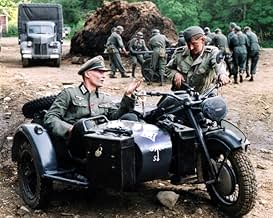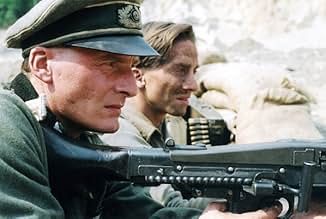"Last Letters from Stalingrad", the 1950 compilation of the supposedly authentic war letters of Nazi soldiers caught in the bloodiest WW2 battle, has become the primary source of inspiration for the unprecedented war epic portraying the last days of WWII fighting in Italy - "The Fallen" and its second part "The Last Letters of Monte Rosa". Authenticity, viewed here as a meticulous, accurate re-enactment of the historical details - battleground weapons from period rifles to tanks and planes, soldiers' uniforms, etc - is more than sufficient condition for the compassionate and intimate presentation of the war daily routine with its sudden changes and upheavals, its cruelties and its rites. In this shoe-string budget production the up-and-coming filmmaker Ari Taub brings fear, absurdity and humor (all related to everyday realities of war) - into their proper balance.
In "Letters" the enemy (the Allies) is not personified, and our attention is focused instead on the uneasy relations between the German infantry and the Italian troops mercilessly raided by the partisans. Hollywood storytelling conventions are inevitable for such a traditional narrative, shot at the same time with - but started even before - the late-nineties wave of WWII epic blockbusters like "Thin Red Line", "Saving Private Ryan" or "Ivo Jima". At the same time a certain theatricality of the everyday, certain comical twists of even the most sad episodes, a true indie spirit of his "Letters" has radically distinguish the film from the glitz and glamour of the "dream factory".
Almost as ambiguous as "Last Letters from Stalingrad", Taub's retro-version also does its best to show a "human document which bares the soul of the man at his worst hour". Moreover, due to its unique balance between the tragic and the comical it provides a true Aristotelean, cathartic release of the emotions, especially in the final scene of German martyrdom and their last photograph for the American magazine (hence for posterity).
After all, Ari might be short for Aristotle.






















